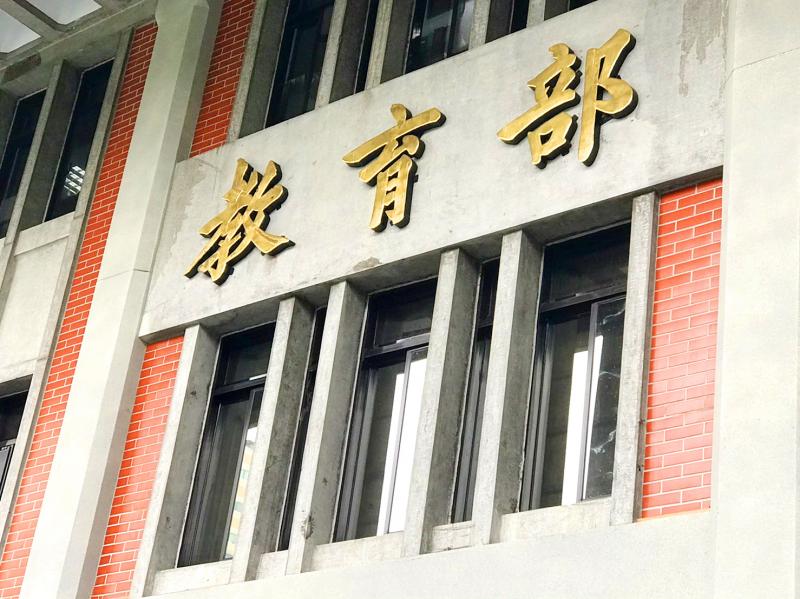The Ministry of Education yesterday unveiled eight measures designed to ensure the quality of graduate theses following allegations of plagiarism and writing by proxies.
The measures include establishing a mechanism for investigating schools that fail to properly evaluate theses, or fail to hold faculty members involved in thesis-related infractions responsible, and adjusting enrollment at these institutions, either by enforcing lower enrollment or even zero enrollment.
The ministry would also publicly announce the ratio of theses not made public at each institution, as well as the ratio of oral defense evaluation committee members hired through “special circumstances,” as well as the school’s rationale behind hiring committee members through such circumstances.

Photo: Rachel Lin, Taipei Times
The ministry introduced the measures following recent cases in which doubts surrounding a number of individuals’ theses brought the issue of academic ethics into question, Higher Education Director-General Chu Chun-chang (朱俊彰) said.
The cases also raised doubts about the quality of education at various institutions, as well as these institutions’ mechanisms for controlling the quality of students’ theses, he said, adding that the ministry hopes to resolve the issue by supervising schools and implementing the eight measures.
The measures, which are to be implemented next year, aim to improve the quality of local degree programs.
If a student’s thesis is called into question, their adviser would also be held accountable, Chu said. Institutions that fail to hold offending students and their advisers accountable would have their enrollment cut or canceled for the year and would have their scholarship programs reduced, among other disciplinary actions, he said.
In some cases, all instructors at the school might be prohibited from supervising graduate students for the year, he added.
The ministry will also work with the National Central Library to develop a system for cross-checking theses, as well as a similar system for journal articles, to prevent plagiarism, he said, adding that the systems would be made available to instructors at all institutions.
Cases where students are suspected of employing proxy writers for their theses would be investigated by the ministry, he said.
The ministry earlier this year established an office to investigate the matter and had already identified 60 theses that were written by proxies, he said.
A number of theses touched upon classified information or patents, which are protected by law and cannot be made public, he said.
On the other hand, some institutions failed to make public theses that are 10 years old or more, which are not protected by law and should be made publicly available, he said, adding that the ministry would order these institutions to look into the matter.

CAUTION: Based on intelligence from the nation’s security agencies, MOFA has cautioned Taiwanese travelers about heightened safety risks in China-friendly countries The Ministry of Foreign Affairs (MOFA) yesterday urged Taiwanese to be aware of their safety when traveling abroad, especially in countries that are friendly to China. China in June last year issued 22 guidelines that allow its courts to try in absentia and sentence to death so-called “diehard” Taiwanese independence activists, even though Chinese courts have no jurisdiction in Taiwan. Late last month, a senior Chinese official gave closed-door instructions to state security units to implement the guidelines in countries friendly to China, a government memo and a senior Taiwan security official said, based on information gathered by Taiwan’s intelligence agency. The

Taiwan Semiconductor Manufacturing Co (TSMC), the world’s largest contract chipmaker, said yesterday that it is looking to hire 8,000 people this year, at a time when the tech giant is expanding production capacity to maintain its lead over competitors. To attract talent, TSMC would launch a large-scale recruitment campaign on campuses across Taiwan, where a newly recruited engineer with a master’s degree could expect to receive an average salary of NT$2.2 million (US$60,912), which is much higher than the 2023 national average of NT$709,000 for those in the same category, according to government statistics. TSMC, which accounted for more than 60 percent

Tung Tzu-hsien (童子賢), a Taiwanese businessman and deputy convener of the nation’s National Climate Change Committee, said yesterday that “electrical power is national power” and nuclear energy is “very important to Taiwan.” Tung made the remarks, suggesting that his views do not align with the country’s current official policy of phasing out nuclear energy, at a forum organized by the Taiwan People’s Party titled “Challenges and Prospects of Taiwan’s AI Industry and Energy Policy.” “Taiwan is currently pursuing industries with high added- value and is developing vigorously, and this all requires electricity,” said the chairman

‘POOP ON STAGE’: The song, which talks about the reluctance to graduate and anxiety about a lack of job opportunities, resonated with many students’ feelings The original song Poop on Stage has been chosen as National Taiwan University’s (NTU) graduation song this year, sparking much debate regarding the song’s title and content, which describes students’ anxiety about post-graduation unemployment. The title, Shang Tai Da Bian (上台大便), is a play on words that literally means “go on stage to poop.” The first three characters, shang tai da (上台大), also mean “to attend NTU,” as “Taida” is a common abbreviation for the university. The last character, bian (便), can mean “convenient” or “then,” but is more commonly associated with defecation. The lyrics of the song describe students’ reluctance to graduate and